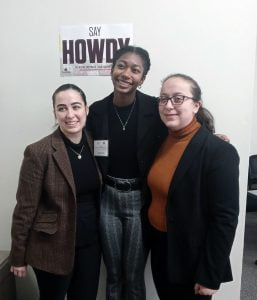Three Hastings College students traveled to College Station, Texas to present at the 12th Annual Texas A&M History Conference last month. The conference featured graduate and undergraduate work from a wide variety of institutions under this year’s theme, “Exploring the Margins of History.”

In selecting this theme, the conference organizers sought to honor the evolution of historical scholarship that has shone a light on people previously ignored or marginalized, and maintains that their time in the shadows remains an essential topic for historical examination.
By celebrating the accomplishments of the present, while also addressing the shortcomings of the past, the conference was an opportunity for students to showcase their research in front of their peers, as well as experts from a variety of historical fields.
Dakotah Willems, a Master of Arts in Teaching (MAT) student from Commerce City, Colorado, presented her project titled, “Local Agents and the Industrial Removal Office in Nebraska.” As part of her research, Willems used archival documents from the Center of Jewish history in New York City to identify who those local agents were and what they did. She found that most were German Jewish pioneers in their communities, owners of successful businesses and members of local government.
Olivia Perez, a senior from Lincoln, Nebraska, presented “Remember This, Too: Eastern European Memory of the Holocaust and the Ramifications of Antisemitism in Pre- and Post-war Soviet Union.” Perez examined the anti-semitic sentiment in Eastern Europe in hopes of understanding both why the events of the Holocaust are remembered differently in the Soviet Union and some of its former satellites. She found that Jews in those countries were afraid to raise the issue because of the long history of anti-semitism in Russian lands, and that the Soviet government did not memorialize the Jewish dead because official Soviet dogma was that the suffering was shared by all Soviet citizens – regardless of religion.
Amani Monroe, a senior from Colorado Springs, Colorado, presented “Beyond the End: Refocusing on the People’s Temple.” Trying to look past the famous and tragic mass suicide in Guyana, Monroe noted that a majority of the members were part of a marginalized population such as black Americans and people who thought everyone should be treated equally. They had sought to join Peoples Temple because they saw that initiative as a step towards racial equality. In this regard, Monroe argued, they seem to have more in common with the Black Panthers and other groups that had lost confidence in the direction of the Civil Rights movement had taken in the 1970s. However, due to the tragic end that the Peoples Temple’s members met, they instead are recognized only as a cult of brainwashed people.
Hastings College is a four-year residential college that focuses on student academic and extracurricular achievement. Hastings’ student-centered initiatives include providing books, an iPad and a two-week study away experience at no additional cost. A block-style semester schedule allows professors and students to focus on fewer classes at a time and promotes hands-on experiences. Discover more at hastings.edu.

